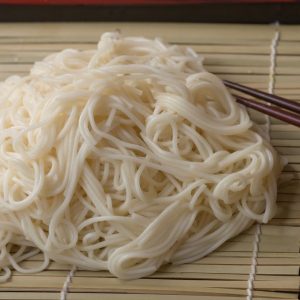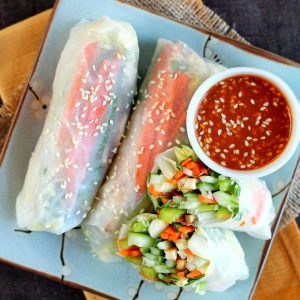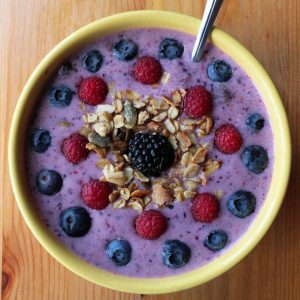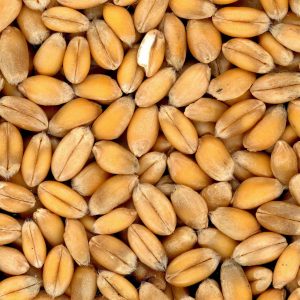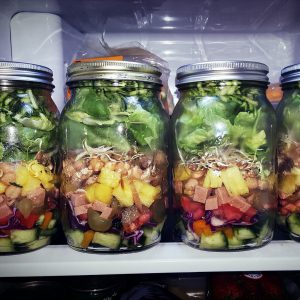Myth Busting: “Eating Fat Makes You Fat!”
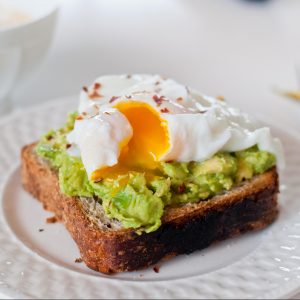

Until 1992, tobacco was a main ingredient in Indian toothpaste as it was thought to be good for your teeth. And during the 1950s, people would deliberately infect themselves with tapeworm as a weight loss measure. As modern day eaters, we are still being bombarded with information that is conflicting, confusing and just plain incorrect when it comes to health and nutrition! Here at Veggiebuzz, we're breaking down the myths and giving it to you straight once and for all.
The myth: "Eating fat makes you fat!"
Maybe it's a case of flawed logic because on the surface it sounds pretty legitimate - a high-fat diet will surely make you fat right? As a result, low-fat diets have been popular for decades, a scientific-sounding solution to shedding the pounds. But it's simply not the case! Not only are fats a healthy addition to diets, 'low-fat' alternatives are much worse for you than their full-fat counterparts. Here are 5 reasons why eating healthy fat will not make you fat.
Reason #1: The fat in a croissant is not the same as the fat in an avocado
To understand fat, you have to understand that there is 'good fat' and 'bad fat'. The reason dietary fat has earned itself a bad rap is because the Western diet is loaded with the less-than-healthy varieties found in things like donuts, fries and cheese. If you can't resist that kind of fatty food sometimes don't worry, we actually evolved to crave them. Because back in caveman days finding calorie sources was not a daily guarantee, we became hard-wired to seek out the most concentrated supply of calories which is fat. Healthy fats, like unhealthy fats, are certainly calorific but it's a case of portion control, not elimination.
Reason #2: The fat on your body is not the same as the fat in almonds
Despite having the same name, the fat you can pinch on your hips and the fat you can pinch from a jar of nuts is not the same fat. To gain fat on your body, you need to eat a surplus of calories from the food you consume. If you eat more than you burn, the additional calories are converted into triglycerides and stored in your fat cells to be used as energy later. Any excess calories you consume is stored as fat - whether those calories come from dietary fat, carbohydrates or protein is irrelevant. But because dietary fat has more calories per gram than the other macronutrients, eating fat will more easily increase your daily calorific intake and so is more likely to cause weight gain. Again, it's a case of portion control, not elimination!
Reason #3: The fat in foods like avocados and nuts are loaded with health benefits
Now that we're familiar with what dietary fat is, let's get into what it does and where to find it! There are two types of healthy dietary fat: monounsaturated fats and polyunsaturated fats. According to some research, monounsaturated fats don't just not make you fat - they even prevent belly fat! You can find monounsaturated fat in food like olives, olive oil, canola oil, avocados, sesame seeds, almonds (and almond butter), cashews (and cashew butter) and peanuts (and peanut butter). The other good fat, polyunsaturated fat, contains omega-3 fatty acids which are essential to brain function, immune system and boosting your mood. In plant form, they can be found in flaxseeds, walnuts, tofu and egg yolks (about 3g of a yolk's 5g of fat comes from polyunsatured fat while the remaining 2g comes from saturated fat. This is why eggs should be consumed in moderation).
Reason #4: Low-fat alternatives to full-fat products are much more unhealthy
This is one of the biggest scams in the diet industry. Next time you're at the supermarket, stop in the dairy aisle and you'll see the sheer amount of 'low-fat', 'no-fat' or 'light' dairy products sitting next to their full-fat counterparts. Things like 'low-fat' milk, 'reduced-fat' yoghurt, 'light' halloumi. They sound like an obvious choice for someone who is trying to be healthy... but think about this for a second. If the fat has been removed from the product, something else has had to replace that fat right? More often than not, food makers put sugar, flour, thickeners and salt into the products in place of the fat which often makes them a higher-in-calories, higher-in-sodium and overall more unnatural version than the original.
The bottom line
Stick to healthy fats and a moderate daily intake and you'll be reaping the benefits that fat has to offer!
A healthy diet should be made up of 20-30% fat so roughly speaking, a 16,000 calorie-a-day diet should include around 40g of fat. This target can be easily hit by eating 1 tablespoon olive oil (13.5g), 1/2 avocado (12g), one tablespoon of peanut butter (8g) and one serving of tofu (4.8g). Total: 38.2g.
Featured Image: Recipe Hub
Sumati MendaNEWSLETTER SIGNUP
Never miss a post from VeggieBuzz!
Sign up for our newsletter to get the latest VeggieBuzz content delivered right to your inbox.







